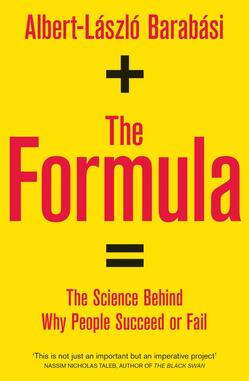 Success can sometimes seem a bit random – is it the idea itself, the person bringing that product or service to the world, or is it just some magical confluence of variables that results in that big, universal yes? Northeastern University professor, Albert-László Barabási, argues in his new book, The Formula: The Universal Laws of Success, that success is not only not random, it’s actually predictable using a simple equation. S = Qr S or “Success” is simply the product of a person’s Q-factor and r, a random idea. The Q-factor is a quantification of each person’s ability to execute an idea; think Jeff Bezos creating Amazon, Simone Biles routinely defying gravity, or Oprah Winfrey doing pretty much anything she wants. But Barabási argues that a high Q-factor alone is not enough to make an idea successful. Oprah’s 1998 film adaptation of Toni Morrison’s Beloved only made a fraction of what it cost to make, and despite generally positive reviews, it’s broadly considered a flop. She also got fired from her first big break co-anchoring the 6 o’clock news. Not even Oprah could pull success from those events. A high r quotient is also not enough. Barabási references Apple’s Newton, an early personal digital assistant similar to the PalmPilot, that got pulled from production after just five years. Even though it was a good idea, poor execution in the form of technical issues and high prices prevented it from ever taking off. So a truly successful event comes from that combination of a great idea in just the right hands: Steve Jobs developing the successor to the Newton – the iPhone, Oprah hosting her culture-changing television show for 25 years, J.K. Rowling creating one of the most successful book to movie to theme park franchises of all time. Great idea, great execution, peak success. But it’s Barabási’s larger takeaway that really caught my attention: “Once my team and I figured out how to measure a scientist’s Q-factor, we learned it remained unchanged throughout her career. […] If you are repeatedly failing at breaking through, you may very well be pursuing the wrong vocation. Once you find that perfect fit, that area or profession where your Q-factor shines, there’s really only one more thing you need to do: not give up.” Barabási goes on to highlight numerous people who’ve found success later in life, something I’ve talked about before. Maybe they just needed to find that right r idea, or maybe they needed to move into a field that better fits their Q-factor. Either way, there is no expiration date on success. You just have to keep trying.
0 Comments
Leave a Reply. |
What is the When I Was 17 Project?When I Was 17 is a blog series dedicated to collecting the varied stories of people's career paths, what they envisioned themselves doing when they were teenagers and how that evolved over the course of their lives. I started this project with the goal of illustrating that it's okay not to know exactly what you want to do when you're 17; many successful people didn't, and these are a few of their stories.
Archives
October 2020
|